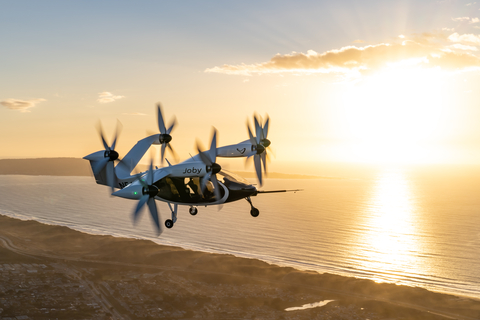Joby and Clay Lacy Partner to Bring First Electric Air Taxi Charger to Southern California

Joby’s all-electric prototype aircraft in flight above
The installation of electrical infrastructure to support Joby’s Global Electric Aviation Charging System (GEACS) comes as part of Clay Lacy’s planned
The GEACS charging interface, which is already in use at Joby’s flight test center in
The Joby aircraft will be deployed on routes of up to 100 miles, and can carry a pilot and four passengers at speeds of up to 200 mph, offering travelers high-speed mobility with no in-flight emissions and a noise footprint that is radically lower than today’s helicopters. The installation of a charger at John Wayne Airport will establish the site as a node in Joby’s
In 2022, Joby announced it was working with Delta Air Lines to deliver seamless airport trips for its customers across several locations, including
“Today’s announcement marks a key moment on the path to delivering our air taxi service in the
“The charging technology we have developed is optimized to support our whole industry, from air taxis delivering short range city flights to more conventional electric aircraft flying longer distances. Joby made the specifications for the universal charging interface freely available to the wider industry in November 2023, to help accelerate the transition to clean flight. We’re therefore very pleased to see it being adopted in this key market,” he added.
Scott Cutshall, SVP Strategy and Sustainability at Clay Lacy Aviation, commented: “Since our founding more than 50 years ago, Clay Lacy has been committed to improving lives for our community, employees, and clients; leading the industry on safety and service while taking action to reduce emissions in both our ground and air operations. We’re excited to be working with Joby to install Southern California’s first air taxi charger and we look forward to the greater convenience it will bring to the
Clay Lacy’s all-new FBO development at John Wayne Airport is expected to be the first in the world to be Gold-certified by the Institute for Sustainable Infrastructure (ISI), reinforcing the company’s longstanding commitment to leadership on sustainability in aviation.
Last year, Joby completed the first-ever flight of an electric air taxi in
About Joby
Joby Aviation, Inc. (NYSE:JOBY) is a
About Clay Lacy Aviation
Founded in 1968 by legendary aviator and industry pioneer Clay Lacy. Today, Clay Lacy Aviation is the world’s most experienced operator of private jets. Prominent individuals and leading corporations trust Clay Lacy for aircraft management, charter, maintenance, and FBO services. The company has aircraft operations and regional offices across the
Forward Looking Statements
This press release contains “forward-looking statements” within the meaning of the “safe harbor” provisions of the Private Securities Litigation Reform Act of 1995, including but not limited to, statements regarding the development and performance of our aircraft and charging system, the growth of our manufacturing capabilities, our regulatory outlook, progress and timing; our business plan, objectives, goals and market opportunity; plans for, and potential benefits of, our strategic partnerships, including our partnerships with Delta and Clay Aviation; plans for potential sites for electrification; and our current expectations relating to our business, financial condition, results of operations, prospects, capital needs and growth of our operations. You can identify forward-looking statements by the fact that they do not relate strictly to historical or current facts. These statements may include words such as “anticipate”, “estimate”, “expect”, “project”, “plan”, “intend”, “believe”, “may”, “will”, “should”, “can have”, “likely” and other words and terms of similar meaning in connection with any discussion of the timing or nature of future operating or financial performance or other events. All forward looking statements are subject to risks and uncertainties that may cause actual results to differ materially, including: our ability to launch our aerial ridesharing service and the growth of the urban air mobility market generally; our ability to produce aircraft that meet our performance expectations in the volumes and on the timelines that we project, and our ability to launch our service; complexities related to obtaining certification and operating in foreign markets; the competitive environment in which we operate; our future capital needs; our ability to adequately protect and enforce our intellectual property rights; our ability to effectively respond to evolving regulations and standards relating to our aircraft; our reliance on third-party suppliers and service partners; uncertainties related to our estimates of the size of the market for our service and future revenue opportunities; and other important factors discussed in the section titled “Risk Factors” in our Annual Report on Form 10-K, filed with the Securities and Exchange Commission (the “SEC”) on March 1, 2023, and in future filings and other reports we file with or furnish to the SEC. Any such forward-looking statements represent management’s estimates and beliefs as of the date of this press release. While we may elect to update such forward-looking statements at some point in the future, we disclaim any obligation to do so, even if subsequent events cause our views to change.
View source version on businesswire.com: https://www.businesswire.com/news/home/20240108975151/en/
Joby Aviation
Investors:
investors@jobyaviation.com
Media:
press@jobyaviation.com
Source: Joby Aviation, Inc.







